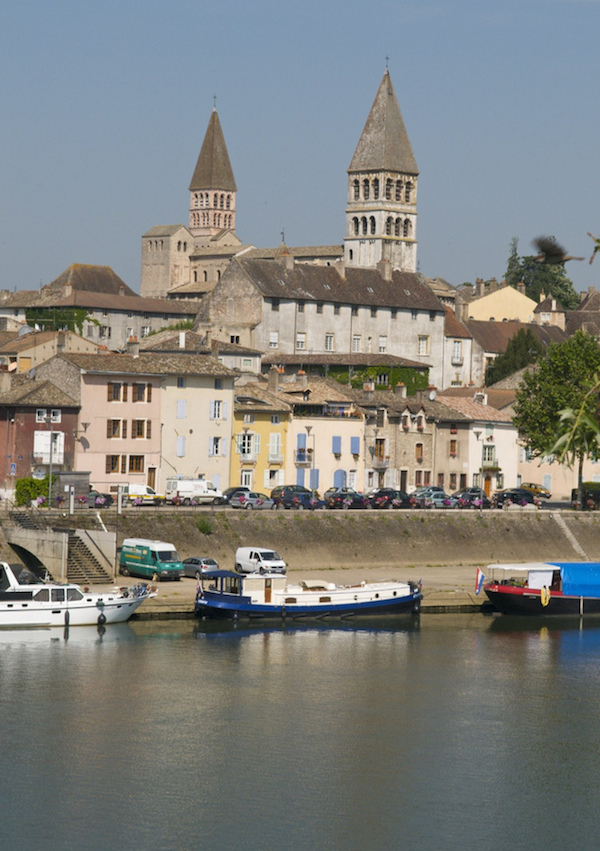“Adventure” is a tricky word. For many, it implies fast-paced, near constant action. And while plenty of adventures do indeed deliver adrenalized thrills up the wazoo, “adventure” doesn’t have to mean hectic and up-tempo. In some places, “adventure” can be as slow and low-key as the current of a lazy river.
Burgundy, the fabled wine-producing département of central France, is crisscrossed by a network of rivers and centuries-old canals practically tailor-made for pleasure cruising. The best way to navigate them is from the deck of a piloted river barge, or peniche, that doubles as a floating hotel. Life unfolds at a different pace in pastoral Burgundy, and its even more relaxed on the rivers. Here’s five reasons why you ought to hurry up to slow down.

The peniche, or river barge.
1. The pace
Sure, you could just drive the 56km (35 mi) Louhans-to-La Truchère-to-Chalon-sur-Saône route and claim you’d experienced Burgundy. You could also knock back a glass of $200 Gevrey-Chambertin Premier Cru in one gulp and call yourself a wine expert, too, but that would be positively barbaric. Like its world-famous wines, Burgundy was made for sipping slowly, and cruising its canals and rivers all but forces you to slow down and stretch out every moment.
The peniche cruises at a leisurely 6kph (4 mph, roughly the speed of a brisk jog), which leaves those on board with plenty of time to observe life along the riverbank. And since you’re not going particularly fast, it’s super-easy to just pull up to whatever cozy village or picnic spot catches your eye, hitch up the boat, and be on your way.

Moving slowly down the river.
2. The sights
France has more than its fair share of gorgeous places, and Burgundy may be one of the fairest of them all. Rolling fields of sunflowers, stately châteaux, 100-year-old farmhouses, and some of the most spectacular sunsets you’ll ever see rank among the prettier-than-a-picture-postcard sights you’ll encounter out here.
Among the more whimsical sights along the Saône and Seille are the stone lockkeepers’ houses perched on the edge of each lock. Small and hundreds of years old, each one is a showcase for the personality of its steward, who run the range from cheerful to crotchety. It takes some time to move through a lock, so don’t be surprised if your lockkeeper attempts to strike up a conversation, tempts you with a glass of wine, or offers you fresh produce from his garden.

Mairie de Tournus. A common sight to behold in the Burgundy region.
3. The sounds
Life on the river is often a quiet and solitary one. For some stretches, the only sounds you’ll hear will be the wind rustling through the trees, the putter of the engine or the quacking of the occasional duck. There are few sensations as wonderful as waking up from a nap to the sound of a church bell tolling faintly in the distance.

Passing through quaint villages starts to feel commonplace.
4. The flavours
One of the more underrated benefits of exploring Burgundy by river is the relative anonymity this part of the region enjoys. While the oenophiles and gastronomes shoulder past each other at the vineyards and fancy restaurants, savvy travellers on the river can pull up for dinner in out-of-the-way towns far from the highway, and many of the small-town restaurants serve up a homemade poulet du Bresse to rival what you’d get in the city. If you’re up for a top table, the town of Tournus is rumoured to have more Michelin-starred restaurants per square mile than any town in France (and some of the best chocolate anywhere), and the wine mecca of Beaune is a definite must-visit for anyone who knows their Pinot noir from their Pinot gris.

The markets of Tournus. Photo by J. Drumsara.
5. The atmosphere
Burgundy looks great, sounds great, tastes great – heck, it even smells great. But perhaps its greatest attribute is how harmoniously all of its elements come together. The river and canal systems offer the chance to really experience how this region works, plays, and lives day by day, and going by barge is perhaps the only way to explore the region in the summertime without being swarmed by crowds.

An 11th century abbey holds strong. Photo by J. Drumsara.
Getting There
Love the idea of Burgundy in the summer but hate crowds? National Geographic Journeys by G Adventures has you covered. “Burgundy by River Barge” hooks you up with ten days of slow-rolling splendour for less than you’d think.























